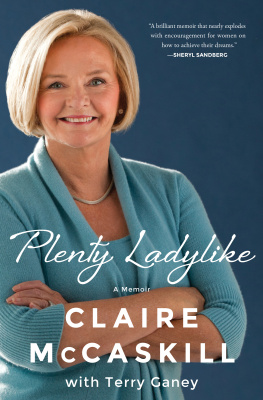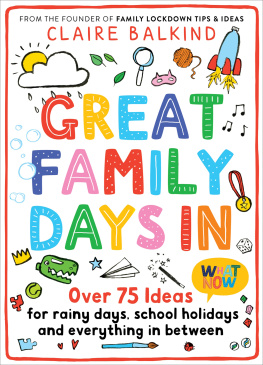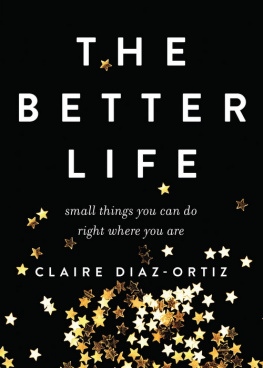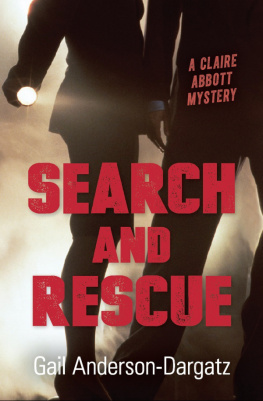Acknowledgments
My first thanks must go to Terry Ganey. He was my partner in this effort. He is a gifted writer and provided much needed structure and discipline to this process. Terry is a highly respected journalist who covered me for years in Missouri, and I always appreciated his doggedness in pursuing even the most elusive story that he thought was important. Now he is my friend.
Next I must express gratitude to my best friend and biggest supporter, my husband Joseph Shepard. He nudged me forward on this book, and as usual, he was right. Joseph has put up with a lot of nonsense because of my career, but always manages a smile of encouragement and boundless love.
My children Austin, Maddie, and Lily, deserve thanks for understanding their mom so well and being the kind of children who make me cry with pride.
My siblings, Anne, Lisa, and Will, have been my rock and a constant reminder that there is no more powerful force in the world than a united family. In fact all of my family, including my stepchildren and my nine and counting grandchildren, are a constant reminder of things way more important than elections.
A special thank you to Priscilla Painton, my editor at Simon & Schuster. Her enthusiasm for this book was contagious and gave me needed confidence. And her editing made it a much better page turner. And a hug to my book agent, Amy Berkower, who morphed from my political supporter to my fierce advocate as we worked to get this book published.
And finally my respect, gratitude, and admiration goes to my staff of today and yesterday. For thirty years I have been incredibly fortunate to have the best and the brightest willing to work with me in the public sector. All of them are responsible for my successes. We have laughed, cried, worried, and celebrated together. I get the attention; they deserve the credit.
About the Authors
Claire McCaskill was the first woman from Missouri elected as a U.S. senator and continues to serve in that position today. She has a BA and a JD from the University of Missouri and worked for the Jackson County prosecutors office before she was elected to her first state legislature position in the Missouri House in 1982. She was elected Jackson County prosecuting attorney in 1992 and Missouri state auditor in 1998. She lives in St. Louis.
Terry Ganey is the author of two New York Times bestsellers: Under the Influence, the Unauthorized Story of the Anheuser-Busch Dynasty (with Peter Hernon), and Innocent Blood, a True Story of Obsession and Serial Murder . A finalist for the Pulitzer Prize in investigative reporting, he covered politics and government for the Associated Press, the St. Louis Post-Dispatch, and the Columbia Daily Tribune .
MEET THE AUTHORS, WATCH VIDEOS AND MORE AT
SimonandSchuster.com
authors.simonandschuster.com/Claire-McCaskill
authors.simonandschuster.com/Terry-Ganey
CHAPTER ONE
Blonde Ambition
S treet after street, door after door, I walked and knocked. Hello, Im Claire McCaskill, and Im an assistant prosecutor. Im running for state representative, and Id appreciate your vote.
I was twenty-eight years old, single, a renter with no money or political organization backing me up. It was 1982, and I was a young prosecutor with courtroom experience who was comfortable making a case and doing hard work. When I ran for my first political office, a seat representing part of Kansas City in the Missouri House, people told me I needed to knock on doors. I knocked on 11,432 of them.
While I remember many of these encounters, one has replayed itself in my head hundreds of times over the years. It was dusk on an early summer evening as I approached a small Tudor in a modest neighborhood. Id been knocking for several hours by the time I reached this house. A man in his upper-middle years opened the door, and I rattled off my greeting. He looked me over slowly, up and down, and said, Youre too young. Your hair is too long. Youre a girl. No way are you tough enough for politics. Those politicians in Jeff Cityd eat you alive. Go find yourself a husband.
And he slammed the door in my face.
I won that raceand I kept on running for the next thirty years.
From a very young age, I was driven. In school I spoke up so much I earned the nickname Motor-mouth McCaskill. I didnt want to just get As; I wanted to win every spelling contest. I didnt want to be just a cheerleader; I wanted to be captain of the squad. Until I got to college I didnt realize that such drive wasnt always socially correct. My parents had done an amazing job of protecting me from a very dangerous point of view: that women should not be ambitious.
My mom, Betty Anne McCaskill, emphasized early on that women can do anything men can do. She refused to let me and my sisters, Anne and Lisa, get a Barbie, Queen of the Prom board game when we were young. To win the game you had to get a dress and a boyfriend and go steady. Dumb game. That is not how you win anything, she told us. While she never discouraged marriage, she and Dad both reinforced the need for us to first be self-sufficient. In that sense, my parents were way ahead of their time in stressing independence. My dads words still ring in my ears: You cant find happiness with someone else until you are happy with yourself. My dad, Bill, gave me the gift of incredible respect for a sense of humor. Even while I was ambitious, the people in my household taught me not to take myself too seriously. And as the most important male figure in my life, my father also gave me permission to be bossy and opinionated.
When I was in high school, I encountered my first situation where I had to choose whether to go along and be popular or to speak out even though I risked alienating some of my friends. The social sorority to which I belonged had always used popularity as the only measure for inclusion. I took the risk of saying that it might be a good idea to look at grades and school activities and maybe work for a little diversity if we were really focused on service as much as prestige. I felt strongly about this, and it hurt when my friends turned against me. That evening, as I was crying in my room, Dad quietly told me to snap out of it. He asked me to choose whether I wanted to be a leader or a follower, pointing out that followers never got their feelings hurt, but leaders always do. He told me one of his corny jokes and made me laugh. That was the year that Dad gave me John F. Kennedys book Profiles in Courage for Christmas.
Each year Dad encouraged me to enter the American Legion speech contest at West Junior High School. Though I made the finals in seventh and eighth grade, I never won. The contest required memorization of the speech, no notes allowed. One of those years I had the traumatic experience of forgetting my speech in front of the entire student body. Part of me wanted to sit out the competition in ninth grade, but a bigger part wanted to win. Dad and I talked about it and decided that my topic for this last try needed to be something I felt strongly about. I chose to give a speech about the Ku Klux Klan. He had me research the KKK, and we decided together that their offensive and repugnant oath would be a dramatic beginning to the speech.
I can recall exactly how I felt standing alone at the podium, and I remember where Dad was sitting. And I can still feel the surge of adrenaline when, as I opened with those sickening words of allegiance to racism, I felt the connection with the audience and the incredible high when the thunderous applause came at the end of the speech, when I closed with the Pledge of Allegiance. Later Mom told me that when they announced me the winner, Dad was crying. It was probably around that time that I started talking about being Missouris first woman governor.










